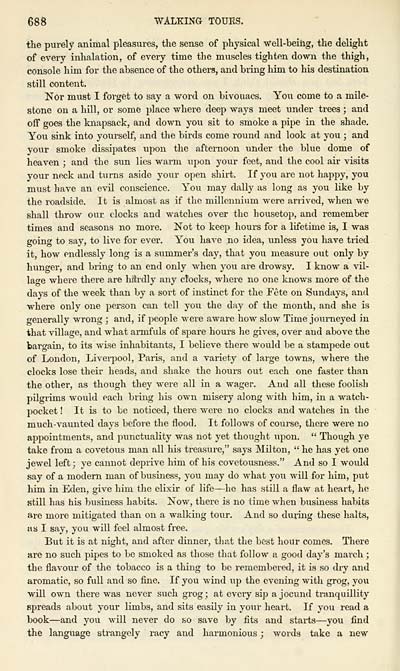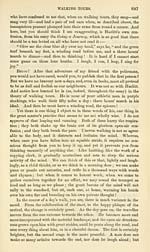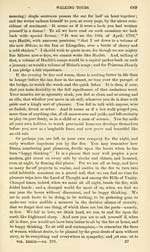Non-Fiction > Uncollected essays > Volumes 33-38, 1876-1878 - Cornhill magazine > Volume 33
(30) Page 688
Download files
Complete book:
Individual page:
Thumbnail gallery: Grid view | List view

688 WALKING TOURS.
the purely animal pleasures, the sense of physical Well-beitig, the delight
of every inhalation, of every time the muscles tighten down the thigh,
console him for the absence of the others, and bring him to his destination
still content.
Nor must I forget to say a word on bivouacs. You come to a mile-
stone on a hill, or some place where deep ways meet under trees ; and
off goes the knapsack, and down you sit to smoke a pipe in the shade.
You sink into yourself, and the birds come round and look at you ; and
your smoke dissipates upon the afternoon under the blue dome of
heaven ; and the sun lies warm upon your feet, and the cool air visits
your neck and turns aside your open shirt. If you are not happy, you
must have an evil conscience. You may dally as long as you like by
the roadside. It is almost as if the millennium were arrived, when we
shall throw our clocks and watches over the housetop, and remember
times and seasons no more. Not to keep hours for a lifetime is, I was
going to say, to live for ever. You have no idea, unless you have tried
it, how endlessly long is a summer's day, that you measure out only by
hunger, and bring to an end only when you are drowsy. I know a vil-
lage where there are hardly any clocks, where no one knows more of the
days of the week than by a sort of instinct for the Fete on Sundays, and
where only one person can tell you the day of the month, and she is
generally wrong ; and, if people were aware how slow Time journeyed in
that village, and what annfuls of spare hours he gives, over and above the
bargain, to its wise inhabitants, I believe there would be a stampede out
of London, Liverpool, Paris, and a variety of large towns, where the
clocks lose their heads, and shake the hours out each one faster than
the other, as though they were all in a wager. And all these foolish
pilgrims would each bring his own misery along with him, in a watch-
pocket ! It is to be noticed, there were no clocks and watches in the
much-vaunted days before the flood. It follows of course, there were no
appointments, and punctuality was not yet thought upon. " Though ye
take from a covetous man all his treasure," says Milton, " he has yet one
jewel left ; ye cannot deprive him of his covetousness." And so I woidd
say of a modern man of business, you may do what you will for him, put
him in Eden, give him the elixir of life — he has still a flaw at heart, he
still has his business habits. Now, there is no time when business habits
are more mitigated than on a Avalking tour. And so during these halts,
us I say, you will feel almost free.
But it is at night, and after dinner, that the best hour comes. There
are no such pipes to be smoked as those that follow a good day's march ;
the flavour of the tobacco is a thing to be remembered, it is so diy and
aromatic, so full and so fine. If you wind up the evening with grog, you
will own there was never such grog ; at every sip a jocund tranquillity
spreads about your limbs, and sits easily in your heart. If you read a
book — and you will never do so save by fits and starts — you find
the language strangely racy and harmonious ; words take a new
the purely animal pleasures, the sense of physical Well-beitig, the delight
of every inhalation, of every time the muscles tighten down the thigh,
console him for the absence of the others, and bring him to his destination
still content.
Nor must I forget to say a word on bivouacs. You come to a mile-
stone on a hill, or some place where deep ways meet under trees ; and
off goes the knapsack, and down you sit to smoke a pipe in the shade.
You sink into yourself, and the birds come round and look at you ; and
your smoke dissipates upon the afternoon under the blue dome of
heaven ; and the sun lies warm upon your feet, and the cool air visits
your neck and turns aside your open shirt. If you are not happy, you
must have an evil conscience. You may dally as long as you like by
the roadside. It is almost as if the millennium were arrived, when we
shall throw our clocks and watches over the housetop, and remember
times and seasons no more. Not to keep hours for a lifetime is, I was
going to say, to live for ever. You have no idea, unless you have tried
it, how endlessly long is a summer's day, that you measure out only by
hunger, and bring to an end only when you are drowsy. I know a vil-
lage where there are hardly any clocks, where no one knows more of the
days of the week than by a sort of instinct for the Fete on Sundays, and
where only one person can tell you the day of the month, and she is
generally wrong ; and, if people were aware how slow Time journeyed in
that village, and what annfuls of spare hours he gives, over and above the
bargain, to its wise inhabitants, I believe there would be a stampede out
of London, Liverpool, Paris, and a variety of large towns, where the
clocks lose their heads, and shake the hours out each one faster than
the other, as though they were all in a wager. And all these foolish
pilgrims would each bring his own misery along with him, in a watch-
pocket ! It is to be noticed, there were no clocks and watches in the
much-vaunted days before the flood. It follows of course, there were no
appointments, and punctuality was not yet thought upon. " Though ye
take from a covetous man all his treasure," says Milton, " he has yet one
jewel left ; ye cannot deprive him of his covetousness." And so I woidd
say of a modern man of business, you may do what you will for him, put
him in Eden, give him the elixir of life — he has still a flaw at heart, he
still has his business habits. Now, there is no time when business habits
are more mitigated than on a Avalking tour. And so during these halts,
us I say, you will feel almost free.
But it is at night, and after dinner, that the best hour comes. There
are no such pipes to be smoked as those that follow a good day's march ;
the flavour of the tobacco is a thing to be remembered, it is so diy and
aromatic, so full and so fine. If you wind up the evening with grog, you
will own there was never such grog ; at every sip a jocund tranquillity
spreads about your limbs, and sits easily in your heart. If you read a
book — and you will never do so save by fits and starts — you find
the language strangely racy and harmonious ; words take a new
Set display mode to: Large image | Transcription
Images and transcriptions on this page, including medium image downloads, may be used under the Creative Commons Attribution 4.0 International Licence unless otherwise stated. ![]()
| Early editions of Robert Louis Stevenson > Non-Fiction > Uncollected essays > Cornhill magazine > Volume 33 > (30) Page 688 |
|---|
| Permanent URL | https://digital.nls.uk/78692793 |
|---|
| Dates / events: |
1876 [Date/event in text] |
|---|---|
| Subject / content: |
Volumes (documents by form) |
| Person / organisation: |
Stevenson, Robert Louis, 1850-1894 [Contributor] |
| Form / genre: |
Written and printed matter > Periodicals |
|---|---|
| Dates / events: |
1860-1975 [Date published] |
| Places: |
Europe >
United Kingdom >
England >
Greater London >
London
(inhabited place) [Place published] |
| Subject / content: |
Fiction Journals (periodicals) Short stories |
| Person / organisation: |
Smith, Elder, and Co. [Publisher] |
| Description | Essays and reviews from contemporary magazines and journals (some of which are republished in the collections). 'Will o' the Mill', from Volume 37 of the 'Cornhill Magazine', is a short story or fable. |
|---|
| Person / organisation: |
Stevenson, Robert Louis, 1850-1894 [Author] |
|---|



